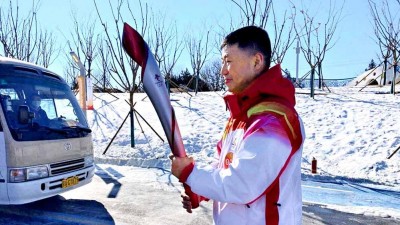
New Delhi, A leading US Senator has criticised China for selecting a soldier engaged in Galwan Valley clashes with Indian troops to promote the Beijing Winter Olympics 2022.
China has selected Qi Fabao, a regimental commander in the People's Liberation Army, who was seriously wounded during June 15, 2020 border clash with Indian troops in the Galwan Valley in eastern Ladakh, as one of the torchbearers.
Senator Jim Risch, a Republican who is a ranking member of the US Senate Foreign Relations Committee, called the move "shameful" and said that the US will continue to support the sovereignty of India.
"It's shameful that Beijing chose a torchbearer for the Olympics 2022 who's part of the military command that attacked India in 2020 and is implementing genocide against the Uyghurs. The US will continue to support Uyghur freedoms and the sovereignty of India," Risch said on Twitter.
Beijing kicked off a three-day Olympic torch relay with Qi as torchbearers, as per a report in China's Global Times newspaper.
Qi took the torch from China's four-time short track speed skating gold medalist Wang Meng. Being held in between Covid-19 outbreaks in China, the Winter Olympics is scheduled to start on February 4.
The Olympic flame was flown in from Greece and will travel to various parts of the country before lighting the Olympic cauldron as a part of the opening ceremony.
Many countries have decided to boycott the Olympics amid Chinese expansionist policy and human rights violation in Uyghurs.
Amid this, an Australian newspaper, the Klaxon, claimed that Chinese People's Liberation Army lost 42 soldiers, not four during Galwan Valley clashes with India troops in eastern Ladakh.
However, the Indian security establishment remains silent over the claims.
The report, filed by Editor Anthony Klan, bases the claims citing report of a group of social media researchers.
The newspaper states that evidence provided by the group of social media researchers, which The Klaxon has independently built on, appears to support claims that China's casualties extended well beyond the four soldiers named by Beijing.


.jpeg)

